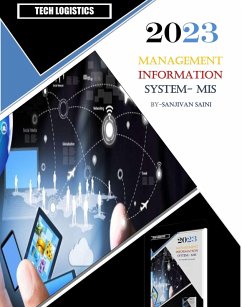"Management Information System" by Sanjivan Saini is a comprehensive book that covers various aspects of Management Information Systems (MIS) and Enterprise Resource Planning (ERP). It provides readers with a deep understanding of the key concepts, principles, and applications related to MIS and ERP. The book is structured into different units, each focusing on essential topics in the field of MIS and ERP. Here is an overview of the units included in the book:
Unit 1: MIS - Introduction
This unit serves as an introduction to Management Information Systems (MIS). It covers the fundamental concepts, objectives, and benefits of MIS in modern organizations. Readers gain insights into the role of MIS in decision-making, planning, and overall business management.
Unit 2: Planning
In this unit, the book delves into the significance of planning in the context of MIS. It explores how MIS aids in strategic planning, operational planning, and resource allocation. The unit may cover topics such as forecasting, budgeting, and performance planning.
Unit 3: Decision Making
This unit focuses on decision-making processes and how MIS supports informed decision-making. It explores various decision-making models, techniques, and tools enabled by MIS. Topics may include data analysis, business intelligence, and reporting.
Unit 4: ERP - Introduction
This unit provides an introduction to Enterprise Resource Planning (ERP) systems. It covers the basics of ERP, its benefits, and its role in integrating business processes. Topics may include ERP modules, implementation considerations, and ERP lifecycle.
Unit 5: ERP Dynamics
Building upon the previous unit, this section delves deeper into ERP dynamics, including system design, customization, and integration. It may explore the different ERP software available in the market and their functionalities.
Unit 6: Managerial Decision Making
In this unit, the book may focus specifically on managerial decision-making processes within the context of MIS and ERP. It may cover decision support systems, data analytics, and predictive modeling.
Unit 7: Data Management
This unit provides insights into the management of data within MIS and ERP systems. It covers data storage, data security, data integrity, and data governance.
Unit 8: File Design and Program Design
This unit delves into file design and program design principles in the context of MIS and ERP systems. It may cover database design, file organization, and programming languages used in ERP systems.
The book appears to provide a comprehensive understanding of Management Information Systems, their role in decision-making and planning, and the importance and dynamics of Enterprise Resource Planning systems. It may be useful for students, professionals, and anyone interested in learning about the concepts, principles, and applications of MIS and ERP in modern business environments.
As the book's contents are outlined in this overview, readers can expect to gain insights into the topics mentioned above and understand how MIS and ERP contribute to organizational efficiency, effectiveness, and decision-making processes.
Unit 1: MIS - Introduction
This unit serves as an introduction to Management Information Systems (MIS). It covers the fundamental concepts, objectives, and benefits of MIS in modern organizations. Readers gain insights into the role of MIS in decision-making, planning, and overall business management.
Unit 2: Planning
In this unit, the book delves into the significance of planning in the context of MIS. It explores how MIS aids in strategic planning, operational planning, and resource allocation. The unit may cover topics such as forecasting, budgeting, and performance planning.
Unit 3: Decision Making
This unit focuses on decision-making processes and how MIS supports informed decision-making. It explores various decision-making models, techniques, and tools enabled by MIS. Topics may include data analysis, business intelligence, and reporting.
Unit 4: ERP - Introduction
This unit provides an introduction to Enterprise Resource Planning (ERP) systems. It covers the basics of ERP, its benefits, and its role in integrating business processes. Topics may include ERP modules, implementation considerations, and ERP lifecycle.
Unit 5: ERP Dynamics
Building upon the previous unit, this section delves deeper into ERP dynamics, including system design, customization, and integration. It may explore the different ERP software available in the market and their functionalities.
Unit 6: Managerial Decision Making
In this unit, the book may focus specifically on managerial decision-making processes within the context of MIS and ERP. It may cover decision support systems, data analytics, and predictive modeling.
Unit 7: Data Management
This unit provides insights into the management of data within MIS and ERP systems. It covers data storage, data security, data integrity, and data governance.
Unit 8: File Design and Program Design
This unit delves into file design and program design principles in the context of MIS and ERP systems. It may cover database design, file organization, and programming languages used in ERP systems.
The book appears to provide a comprehensive understanding of Management Information Systems, their role in decision-making and planning, and the importance and dynamics of Enterprise Resource Planning systems. It may be useful for students, professionals, and anyone interested in learning about the concepts, principles, and applications of MIS and ERP in modern business environments.
As the book's contents are outlined in this overview, readers can expect to gain insights into the topics mentioned above and understand how MIS and ERP contribute to organizational efficiency, effectiveness, and decision-making processes.
Dieser Download kann aus rechtlichen Gründen nur mit Rechnungsadresse in A, B, CY, CZ, D, DK, EW, E, FIN, F, GR, H, IRL, I, LT, L, LR, M, NL, PL, P, R, S, SLO, SK ausgeliefert werden.









